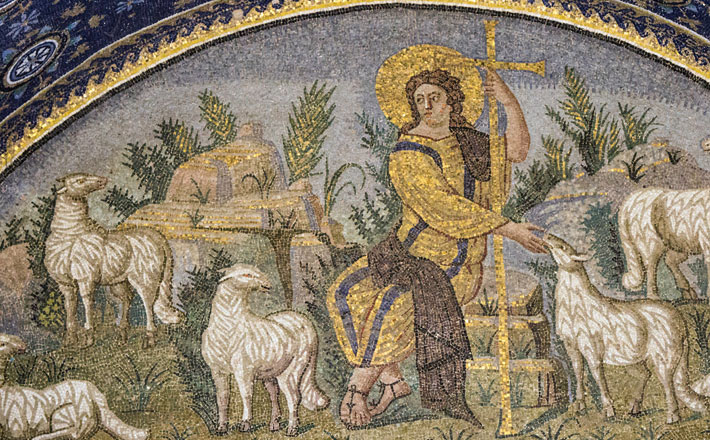Commentary on 1 John 3:16-24
“And this is his commandment, that we should believe in the name of his Son Jesus Christ and love one another, just as he has commanded us” (1 John 3:23).
“In truth it is impossible to love one another in the right way if we do not have faith in Christ, just as it is impossible to believe in the name of Christ if we do not love one another,” The Venerable Bede (Patrologia Latina).
Just before the 2012 presidential election in the United States, CNN posted to its website an interesting quiz: “Do you believe in a red state Jesus or a blue state Jesus”?1 You could answer a series of questions about how you read the Gospels and understand the message and meaning of Jesus and, by the nature of your answers, the quiz would tell you whether you believe in a Jesus who is a supporter of American democratic values or American republican values. One feature of the quiz’s profiling is that the “red” (republican) Jesus can be summed up in terms of John 3:16: Jesus came to bring salvation to those who believe; the “blue” (democrat) Jesus is summed up in Matthew 25:40: “’Truly I tell you, just as you did it to one of the least of these who are members of my family, you did it to me.’” Which is right? Well, the quiz (probably not to the surprise of its creators) is flawed by forcing you to choose ostensibly mutually exclusive options. Was Jesus all about faith, or all about love? The gospel tradition obviously bears witness to the essential importance of both! And these twin convictions (the primacy of faith, and the primary of love) are both deeply embedded in the Johannine tradition.
While there is no way to be certain, many scholars suggest that 1 John is a text that provides clarifications in view of possible or even actual misunderstandings and misinterpretations of the Fourth Gospel. (In that sense, it would have been the first commentary on the Gospel of John!) If this is accurate, one could see 1 John 3:23 as a way of ensuring that two main threads (faith in Christ, mutuality of love) of the Fourth-Gospel-garment are interwoven. For good reason, the Gospel of John is known as the “Gospel of Faith” — faith language appears over 100 times in the book! But “love” is, no doubt, also a leitmotif of the gospel, as becomes especially apparent in the frequency of the word agape in the famous Farewell Discourse of John’s Gospel (John 14-16).
Unfortunately, there have been trends and crosscurrents of debate and division that have led to a problematic bifurcation that can easily become distorted into a “faith vs. works” mentality. Twentieth century Reformed theologian, G.C. Berkouwer, helpfully articulates a more excellent way forward by modeling 1 John 3:23, bringing faith and love together, rather than standing by an inaccurate understanding of sola fide. Berkouwer writes, especially clarifying Luther’s thought:
Faith is not a competitor of love and good works but rather a sponsor, and gives foundation to them because it acknowledges the grace of God. Again and again, and for this reason, Luther pointed out the deep significance of the first commandment [“no other gods”] and accounted all works performed outside its sphere as nothing.2
Berkouwer goes on to explain how Luther saw the move from faith to loving one’s neighbor: “all one’s works must promote the welfare of one’s neighbor, since in his faith each has all the possession he requires and can therefore freely and lovingly devote his entire life to the service of his fellowman.”3
This kind of perspective seems to be reinforced by the way the author frames his statement in 1 John 3:23: believing in Jesus and loving one another are not represented as two separate commandments, but rather as one command. What God hath joined together, let no one put asunder! First John 3:24 completes the chapter by positing that learning obedience to the fullness of both Christ-believing and people-loving is what it means to abide in Jesus, to have a vital connection to the source of all eternal and true life and joy through the Spirit.
Notes:
1 http://www.cnn.com/2012/11/02/politics/red-blue-state-jesus/
2 G.C. Berkouwer, Faith and Sanctification (Grand Rapids, MI: Eerdmans, 1952), 32-33.
3 Ibid, 33.


April 26, 2015